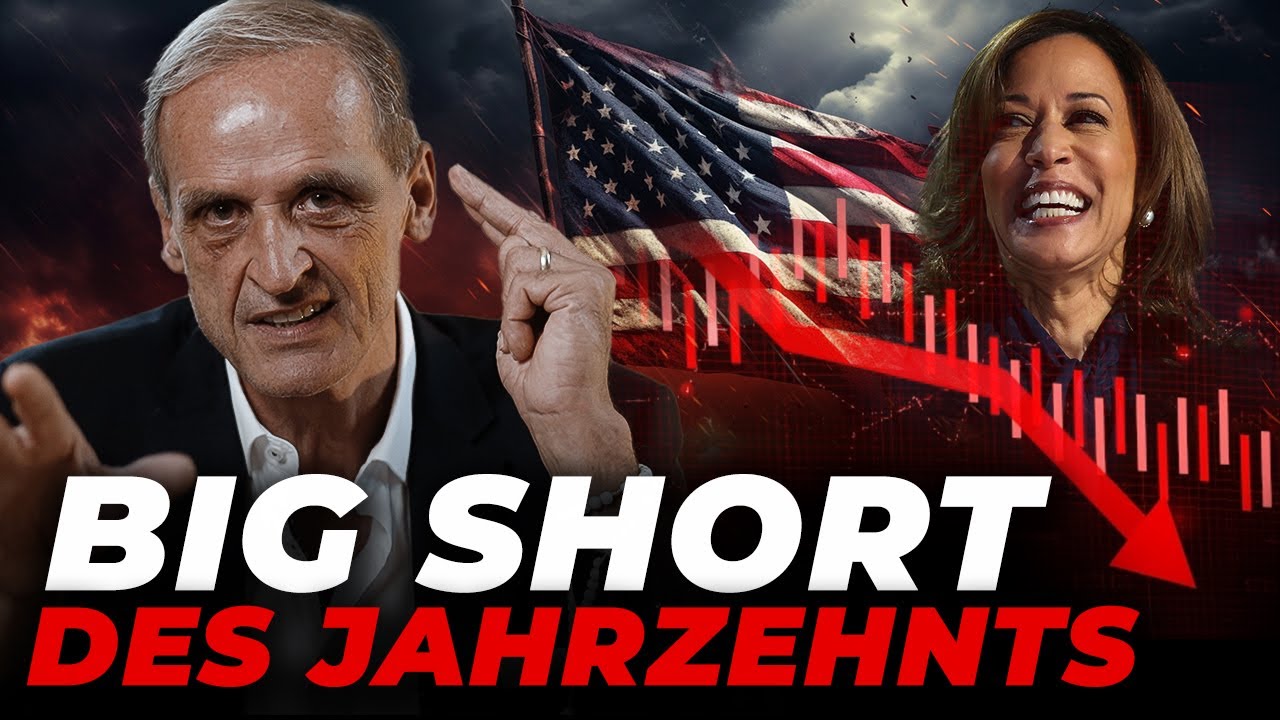Prof Steve Henke: Please Listen, Banks Will Seize Your Money, Do This Now To Get Rich During Crisis
Summary
TLDRDer US-Ökonomie wird eine Rezession in naher Zukunft vorhergesagt, basierend auf einer Abnahme des Geldbestands und steigenden Arbeitslosenzahlen. Prof. Steve Hanke warnt vor wirtschaftlichen Problemen und sieht im Anleihemarkt sowie Gold als sicheren Zufluchtsort. Er empfiehlt, im Voraus zu investieren, um den bevorstehenden wirtschaftlichen Stürmen entgegenzuwirken.
Takeaways
- 📉 Die Geldmenge in den USA ist niedriger als im Juli 2022, was in der Geschichte der FED nur vier Mal passiert ist und jedes Mal von einer Rezession gefolgt wurde.
- 🚨 Eine Rückkehr zur Rezession in den USA könnte spätestens in diesem Jahr oder Anfang nächsten Jahres einsetzen, basierend auf der Kontraktion der Geldmenge.
- 📈 Die Arbeitslosenquote ist von 3,5% im Jahr 2023 ansteigen und erreichte im Juli 2024 4,3%, was auf tieferliegende wirtschaftliche Probleme hinweist.
- 💹 Die Inflation hat ihren Höhepunkt im Juni 2022 mit 9,9% erreicht und ist nun auf 2,9% gesunken, was auf eine langsamere Wirtschaft und sinkende Preise hindeutet.
- 📈 Die Börsenbewertungen sind hoch, mit dem Schiller-CAPE-Verhältnis bei 35, eines der höchsten Niveaus in der Geschichte, was auf eine mögliche Börsenblase hindeutet.
- 🏦 Die FED wird kritisiert, weil sie zu spät reagiert und sich auf falsche Indikatoren konzentriert, insbesondere zu sehr auf tägliche Daten statt auf die Geldmenge.
- 💼 Professor Steve Hanky empfiehlt, in Zeiten einer bevorstehenden Rezession Investitionen in 10-jährige US-Regierungsanleihen, da sie als sichere und profitable Anlage gelten.
- 💵 Warren Buffett, der durch das Sammeln von Bargeld und Verringern seiner Aktienpositionen vor einer möglichen Marktturbulenz vorbereitet, wird als Vorbild für Anleger genannt.
- 🔒 Gold wird als Hedge gegen wirtschaftliche Unsicherheit empfohlen, da es in Zeiten sinkender Zinssätze und einer schwächeren Dollar werthaltig sein könnte.
- 🛑 Anleger sollten vorsichtig sein und ihre Aktienpositionen nicht erhöhen, sondern lieber Bargeld an累积, um auf eine mögliche Rezession vorzubereiten.
Q & A
Was bedeutet die Aussage, dass das Geldangebot in den USA niedriger ist als im Juli 2022?
-Diese Aussage bedeutet, dass es weniger Geld im Umlauf gibt als zu einem früheren Zeitpunkt, was auf eine Verlangsamung der Wirtschaft hindeutet und in der Vergangenheit häufig von Rezessionen oder der Großen Depression gefolgt wurde.
Wie oft ist es in der Geschichte der FED bisher vorgekommen, dass das Geldangebot unter dem Stand eines früheren Datums lag?
-Es ist nur vier Mal in der Geschichte der FED vorgekommen, dass das Geldangebot unter dem Stand eines früheren Datums lag, einschließlich des Jahres 2022.
Was passierte in den Fällen, in denen das Geldangebot nach dem Juli 2022 gesunken ist?
-In allen Fällen, in denen das Geldangebot nach dem Juli 2022 gesunken ist, wurde dies von einer Rezession oder der Großen Depression gefolgt.
Welche Rolle spielt die Arbeitslosigkeit in der wirtschaftlichen Gesundheit gemäß dem Skript?
-Die Arbeitslosigkeit ist ein Indikator für die wirtschaftliche Gesundheit. Wenn Menschen ihre Arbeitsplätze verlieren, verlieren sie auch ihr Einkommen und ihre Kaufkraft, was zu weniger Nachfrage und verlangsamtem Wachstum führt.
Was ist das Hauptproblem, wenn die FED sich zu sehr auf tägliche Daten konzentriert?
-Das Hauptproblem ist, dass die FED reaktiv statt proaktiv Entscheidungen trifft, da sie die täglichen Daten, die heute erscheinen, als Reaktion auf Geldangebotsänderungen, die ein oder zwei Jahre zuvor stattgefunden haben, missinterpretiert.
Was ist derzeitiger Stand des Inflation in den USA gemäß dem Skript?
-Derzeitiger Stand der Inflation in den USA ist 2,9%, und es wird vorhergesagt, dass sie bis Ende des Jahres auf zwischen 2,5 und 3% sinken wird.
Wie beurteilt der Professor Steve Hanky den aktuellen Zustand des US-Börsenmarktes?
-Professor Steve Hanky sieht den aktuellen Zustand des US-Börsenmarktes als sehr teuer ein, da die Bewertung nach Robert Shillers CAPE-Modell 35 Mal höher ist als im Durchschnitt des vergangenen Jahrzehnts.
Was sind die Hauptempfehlungen von Professor Hanky für Anleger in Vorbereitung auf eine mögliche Rezession?
-Professor Hanky empfiehlt Anlegern, in 10-jährige US-Regierungsanleihen zu investieren, in Bargeld umzuschichten und Gold als Schutz vor wirtschaftlicher Unsicherheit hinzuzufügen.
Welche Rolle spielt Gold in der aktuellen wirtschaftlichen Situation nach Ansicht von Professor Hanky?
-Gold wird von Professor Hanky als ein sicherer Hafen in turbulenten Zeiten und als Hedge gegen wirtschaftliche Unsicherheit empfohlen, insbesondere wenn die FED im Jahr 2025 wahrscheinlich die Zinssätze stark senkt und der Dollar因此价值下降, was die Goldpreise steigen lässt.
Was ist das Hauptargument von Professor Hanky gegen die FEDs Herangehensweise an die Geldpolitik?
-Das Hauptargument von Professor Hanky gegen die FEDs Herangehensweise ist, dass sie sich zu sehr auf Zinssätze konzentriert und nicht genug auf das Geldangebot achtet, was als zuverlässiger Indikator für die wirtschaftliche Entwicklung angesehen wird.
Outlines

هذا القسم متوفر فقط للمشتركين. يرجى الترقية للوصول إلى هذه الميزة.
قم بالترقية الآنMindmap

هذا القسم متوفر فقط للمشتركين. يرجى الترقية للوصول إلى هذه الميزة.
قم بالترقية الآنKeywords

هذا القسم متوفر فقط للمشتركين. يرجى الترقية للوصول إلى هذه الميزة.
قم بالترقية الآنHighlights

هذا القسم متوفر فقط للمشتركين. يرجى الترقية للوصول إلى هذه الميزة.
قم بالترقية الآنTranscripts

هذا القسم متوفر فقط للمشتركين. يرجى الترقية للوصول إلى هذه الميزة.
قم بالترقية الآنتصفح المزيد من مقاطع الفيديو ذات الصلة
5.0 / 5 (0 votes)






